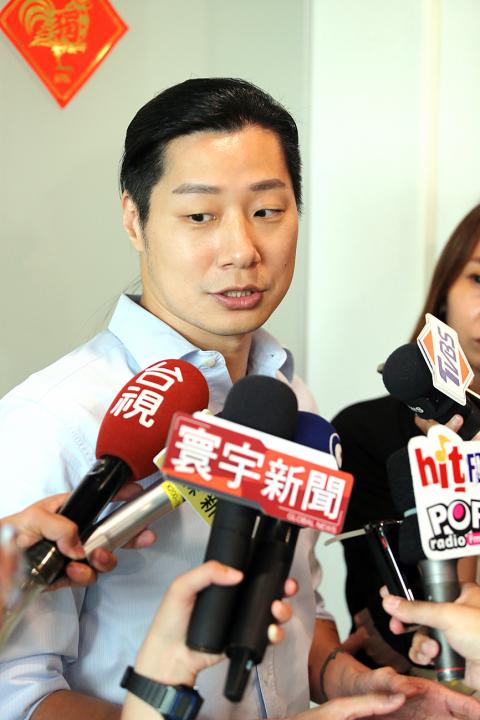The online publication of the official guide to the Taipei Summer Universiade in English has come under fire from New Power Party (NPP) legislators for using the name “Chinese Taipei” rather than Taiwan, resulting in “absurd” descriptions of the nation, such as “Chinese Taipei is a special island.”
NPP Executive Chairman Huang Kuo-chang (黃國昌) posted two screenshots of the guide on his Facebook page on Monday night, which he described as “absurd English phraseology.”
One of the screenshots showed page 21 of the guide, under “General Information,” which states: “Introduction of Our Island — Chinese Taipei. Chinese Taipei is long and narrow that lies north to south.”

Photo: CNA
The Universiade offers “the best chance to market Taiwan to the world, but it is surprising that we have to introduce ourselves in such a frustrating way. We must work harder to join the global community under the name Taiwan,” Huang said.
NPP Legislator Freddy Lim (林昶佐) also posted a screenshot of page 25 of the guide, which states: “Chinese Taipei is a special island and its capital Taipei is a great place to experience Taipei’s culture. It is hoped that the Taipei 2017 Summer Universiade will allow Chinese Taipei to be in the spotlight of the world, attract the world to Chinese Taipei and let the world remember Chinese Taipei.”
Lim added a comment: “Welcome to Taipei, Chinese Taipei!”
Taipei Universiade Organizing Committee spokesman Yang Ching-tang (楊景棠) said the term “Chinese Taipei” was used in accordance with the agreement between the International Olympic Committee, Lausanne and the Chinese Taipei Olympic Committee, Taipei, in 1981.
The application for holding the Universiade was submitted by the Chinese Taipei Olympic Committee, and since the Universiade is an international event, Taiwan must conform to the agreement, Yang said.
Moreover, the Universiade is hosted by the International University Sports Federation, so all official published content must be reviewed by the federation, he said.

DAREDEVIL: Honnold said it had always been a dream of his to climb Taipei 101, while a Netflix producer said the skyscraper was ‘a real icon of this country’ US climber Alex Honnold yesterday took on Taiwan’s tallest building, becoming the first person to scale Taipei 101 without a rope, harness or safety net. Hundreds of spectators gathered at the base of the 101-story skyscraper to watch Honnold, 40, embark on his daredevil feat, which was also broadcast live on Netflix. Dressed in a red T-shirt and yellow custom-made climbing shoes, Honnold swiftly moved up the southeast face of the glass and steel building. At one point, he stepped onto a platform midway up to wave down at fans and onlookers who were taking photos. People watching from inside

A Vietnamese migrant worker yesterday won NT$12 million (US$379,627) on a Lunar New Year scratch card in Kaohsiung as part of Taiwan Lottery Co’s (台灣彩券) “NT$12 Million Grand Fortune” (1200萬大吉利) game. The man was the first top-prize winner of the new game launched on Jan. 6 to mark the Lunar New Year. Three Vietnamese migrant workers visited a Taiwan Lottery shop on Xinyue Street in Kaohsiung’s Gangshan District (崗山), a store representative said. The player bought multiple tickets and, after winning nothing, held the final lottery ticket in one hand and rubbed the store’s statue of the Maitreya Buddha’s belly with the other,

Japan’s strategic alliance with the US would collapse if Tokyo were to turn away from a conflict in Taiwan, Japanese Prime Minister Sanae Takaichi said yesterday, but distanced herself from previous comments that suggested a possible military response in such an event. Takaichi expressed her latest views on a nationally broadcast TV program late on Monday, where an opposition party leader criticized her for igniting tensions with China with the earlier remarks. Ties between Japan and China have sunk to the worst level in years after Takaichi said in November that a hypothetical Chinese attack on Taiwan could bring about a Japanese

‘COMMITTED TO DETERRENCE’: Washington would stand by its allies, but it can only help as much as countries help themselves, Raymond Greene said The US is committed to deterrence in the first island chain, but it should not bear the burden alone, as “freedom is not free,” American Institute in Taiwan Director Raymond Greene said in a speech at the Institute for National Defense and Security Research’s “Strengthening Resilience: Defense as the Engine of Development” seminar in Taipei yesterday. In the speech, titled “Investing Together and a Secure and Prosperous Future,” Greene highlighted the contributions of US President Donald Trump’s administration to Taiwan’s defense efforts, including the establishment of supply chains for drones and autonomous systems, offers of security assistance and the expansion of